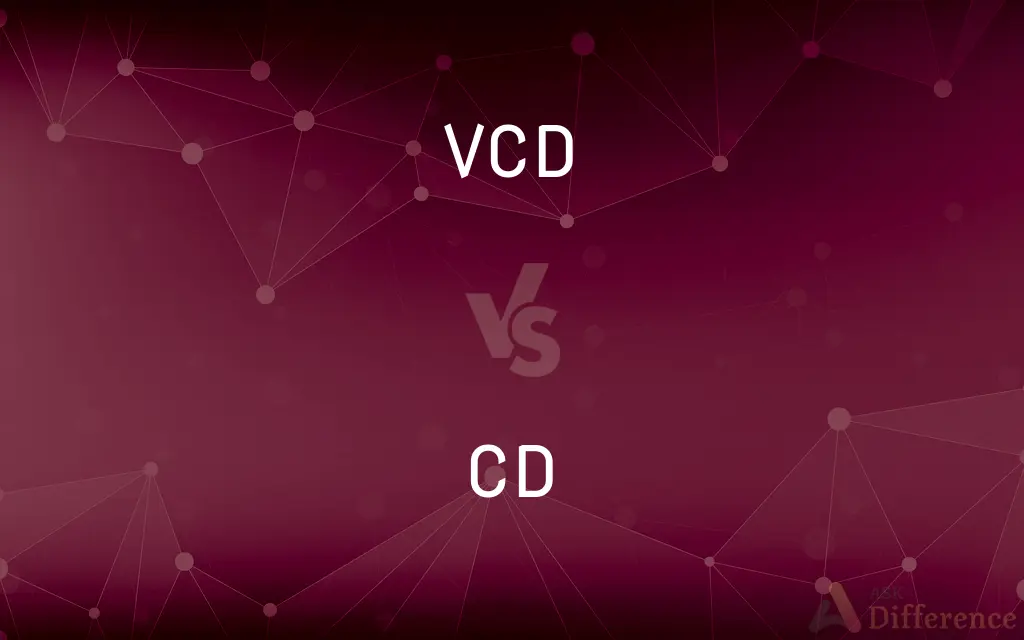VCD vs. CD — What's the Difference?
By Tayyaba Rehman — Published on October 21, 2023
A VCD (Video Compact Disc) is designed to hold video data, while a CD (Compact Disc) typically holds audio data but can also store other data types. VCDs allow for movie playback, and CDs are generally used for music.

Difference Between VCD and CD
Table of Contents
ADVERTISEMENT
Key Differences
VCD, or Video Compact Disc, and CD, or Compact Disc, are optical disc formats, with VCD primarily specializing in storing MPEG-1 standard video and CD predominantly housing audio files. VCDs are designed to hold video data like movies or video songs, enabling playback on compatible players, while CDs, being versatile, typically store music but can also hold data, images, and video.
The structure of a VCD allows it to hold up to 800 megabytes of data, equating to approximately 74 minutes of video content, and CDs usually have a data capacity of 650 to 700 megabytes, which generally translates to around 80 minutes of audio content. VCDs are more attuned to providing users with visual entertainment, while CDs cater primarily to auditory experiences but do offer flexibility in data storage.
In terms of quality, VCDs utilize a compression standard that results in lower resolution and lesser quality compared to DVD video format, and CDs employ a digital format ensuring high-quality audio output. VCDs are often seen as a lower-quality video medium, suited for smaller files, whereas CDs are recognized for delivering crisp and clear audio playback.
When considering accessibility, VCDs may have limitations as not all DVD and Blu-ray players support the VCD format, and CDs have widespread compatibility, being playable on numerous devices such as CD players, computers, and DVD players. VCDs, therefore, might pose restrictions in usage due to compatibility constraints, whereas CDs enjoy extensive accessibility due to universal support.
Comparison Chart
Primary Use
Video Playback
Audio Playback, Data Storage
ADVERTISEMENT
Data Capacity
800 MB
650-700 MB
Quality
Lower Resolution, Lesser Quality
High-Quality Audio Output
Compatibility
Limited Compatibility
Widespread Compatibility
Content Duration
Approx. 74 Minutes of Video
Approx. 80 Minutes of Audio
Compare with Definitions
VCD
VCDs offer lower resolution compared to DVDs.
While watching a film on VCD, the resolution was noticeably lower than a DVD.
CD
CDs can also store data, images, and video, aside from audio.
I used a CD to back up important documents and photos.
VCD
VCDs typically have a data capacity of up to 800 megabytes.
The amount of video a VCD can hold is limited to its 800 MB capacity.
CD
CDs are recognized for delivering high-quality audio playback.
The music on the CD sounded clear and crisp, with no distortions.
VCD
VCDs utilize the MPEG-1 standard to compress video data.
The quality of the movie on the VCD was decent, considering it uses MPEG-1 compression.
CD
CDs can hold approximately 650 to 700 megabytes of data.
The CD had enough space to store all the songs from the artist's new album.
VCD
A VCD is an optical disc specifically designed to hold video data.
I found an old VCD of my favorite movie in the attic.
CD
CDs have widespread compatibility with various players and devices.
I was able to play the CD on my computer, car player, and stereo system.
VCD
VCDs may have limited compatibility with some modern players.
I wanted to play a VCD, but my player only supports DVDs and Blu-rays.
CD
The chemical suymbol for cadmium, a metallic element of atomic number 48.
CD
The abbreviation for the candela, the basic unit of luminous intensity adopted under the System International d'Unites.
CD
An acronym for compact disk, a disk-shaped recording of binary data that is smaller than a phonograph record, and is recorded and played back by a compact disk player, an electronic device containing a laser. The term is also used generically to refer to the medium as a data storage medium.
CD
A compact disk player.
CD
An acronym for certificate of deposit, a debt instrument issued by a bank for a fixed time period, usually paying interest.
CD
A soft bluish-white ductile malleable toxic bivalent metallic element; occurs in association with zinc ores
CD
The basic unit of luminous intensity adopted under the Systeme International d'Unites; equal to 1/60 of the luminous intensity per square centimeter of a black body radiating at the temperature of 2,046 degrees Kelvin
CD
A debt instrument issued by a bank; usually pays interest
CD
A digitally encoded recording on an optical disk that is smaller than a phonograph record; played back by a laser
CD
Being one hundred more than three hundred
CD
A CD is a versatile optical disc used primarily for storing audio data.
I listened to my favorite album on a CD during the drive.
Common Curiosities
What does VCD stand for?
VCD stands for Video Compact Disc.
How much data can a CD typically store?
A CD typically has a data capacity of 650 to 700 megabytes.
What is the primary use of a CD?
A CD is primarily used for audio playback but can also store data, images, and video.
How much data can a VCD hold?
A VCD can hold up to 800 megabytes of data.
Can VCDs be played on all DVD players?
Not all, some DVD players may not support the VCD format.
Is the video quality of a VCD high?
No, VCDs offer lower resolution and quality compared to DVDs.
Are VCDs commonly used today?
VCDs are less common today with the prevalence of DVDs, Blu-rays, and digital formats.
Are CDs still in popular use?
While not as dominant as before, CDs are still used, especially in the music industry.
Do VCDs have universal compatibility?
No, VCDs have limited compatibility and may not work on all players.
Are CDs versatile in terms of data storage?
Yes, CDs can store a variety of data types including audio, images, and documents.
Do CDs have extensive device compatibility?
Yes, CDs enjoy widespread compatibility and can be played on numerous devices.
Do CDs offer high-quality audio playback?
Yes, CDs are known for delivering high-quality and clear audio playback.
Can a CD hold video data?
Yes, CDs can hold video data, but they are primarily designed for audio.
Can VCDs store audio data?
Yes, but they are primarily designed for video data, and other formats are more suitable for audio.
Is the data capacity of a VCD typically higher than that of a CD?
Yes, VCDs can typically hold up to 800 MB, while CDs usually hold 650 to 700 MB.
Share Your Discovery

Previous Comparison
Wholesale Banking vs. Corporate Banking
Next Comparison
Poke vs. TickleAuthor Spotlight
Written by
Tayyaba RehmanTayyaba Rehman is a distinguished writer, currently serving as a primary contributor to askdifference.com. As a researcher in semantics and etymology, Tayyaba's passion for the complexity of languages and their distinctions has found a perfect home on the platform. Tayyaba delves into the intricacies of language, distinguishing between commonly confused words and phrases, thereby providing clarity for readers worldwide.










































